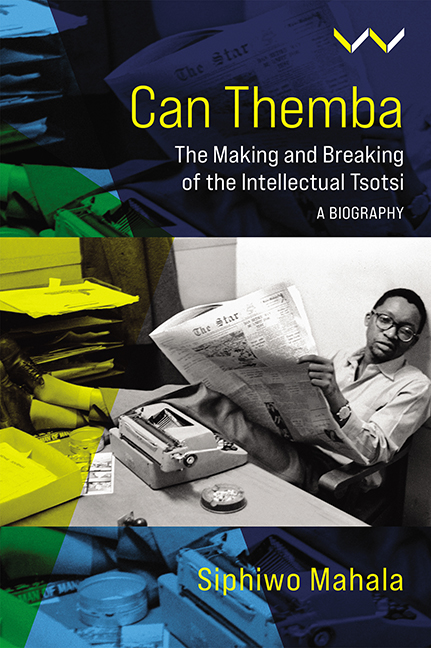Book contents
- Frontmatter
- Dedication
- Epigraph
- Contents
- List of Illustrations
- Acknowledgements
- Introduction
- PART I Death and Birth of a Scribe
- PART II ‘Live Fast and Die Young’
- PART III The ‘Intellectual Tsotsi’
- PART IV Dances with Texts: Writing and Storytelling
- PART V A Writer’s Immortality
- Postscript: The Three Burials of Can Themba
- Notes
- Bibliography
- Index
10 - Black Englishman or Detribalised African? A Quest for Shared Identities
Published online by Cambridge University Press: 26 May 2022
- Frontmatter
- Dedication
- Epigraph
- Contents
- List of Illustrations
- Acknowledgements
- Introduction
- PART I Death and Birth of a Scribe
- PART II ‘Live Fast and Die Young’
- PART III The ‘Intellectual Tsotsi’
- PART IV Dances with Texts: Writing and Storytelling
- PART V A Writer’s Immortality
- Postscript: The Three Burials of Can Themba
- Notes
- Bibliography
- Index
Summary
We spoke English and Afrikaans in the house because we were both from ‘detribalised’ family backgrounds – blacks whose first language was Afrikaans. We were not the stereotypical religious family, walking to church on Sundays together with their children. Can professed to be atheist and I am a hard-core Anglican. I still sing in the church choir to this date.We never clashed because we respected each other's beliefs.
Anne Themba — Can Themba Memorial Lecture pamphlet (June 2013)As we grapple with the question, ‘Who was Can Themba?’, an important related question arises: ‘Who did Can Themba think he was?’
Can Themba's life was cut so brutally short, leaving these fundamental questions lingering and a lot more unaccomplished. So much for Themba's life trajectory, and the demise hastened (as for so many of his peers) by the fate that sited him in South Africa at a time when burgeoning creativity was being stifled by the rapid evolution of grand apartheid; and by a full-blown addiction. Because the glamour and drama of the Drum days, and the tragic whiff of doomed love and self-destruction via the bottle, have so often been the focus of studies of his life and writing, a thorough scrutiny of his self-identity and the complexities of his location in context has been lacking, along with detailed investigation of his politics and his intellectual legacy.
It is at times easy to describe what one is not, but a more difficult task is to describe what one is or stands for. The pertinent questions germane to Can Themba's identity are whether he fell into the category disparagingly referred to at the time as a ‘Black Englishman’, or if he fitted the definition of a ‘detribalised African’. These two categories are obviously subject to interpretation, and are not mutually exclusive; the same individual can possess elements of each. While Anne Themba, in the above epigraph, might have proclaimed quite proudly that she and her husband were a detribalised family, citing as proof the issues of language and modern tolerance of their divergent attitudes towards religion, the counterclaim could be made that in their process of detribalisation, they had lost their cultural doctrines, including their native languages.
The so-called Black Englishmen of Can Themba's era were a cohort ridiculed for aspiring to be something they were not.
- Type
- Chapter
- Information
- Can ThembaThe Making and Breaking of the Intellectual Tsotsi, a Biography, pp. 111 - 130Publisher: Wits University PressPrint publication year: 2022



